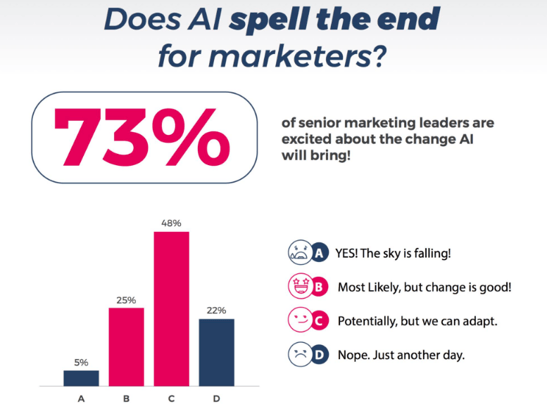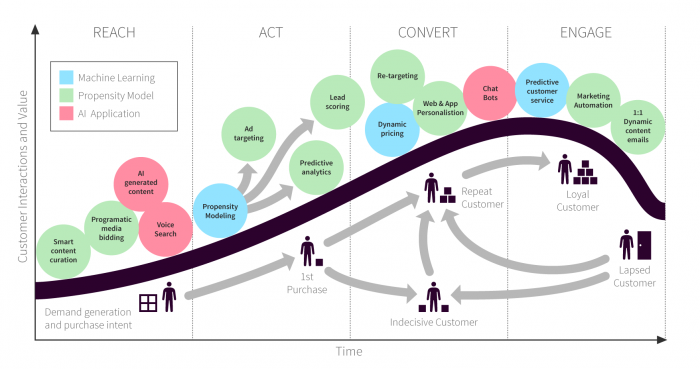August Round-up: Better Meta Targeting, Google Glitch & UX Best Practice
The latest version of our newsletter should have settled in your email inbox, detailing the need-to-know information and must-read thought leadership...
Read moreIn my latest blog, I discuss the importance of AI and how this growing trend can be applied to marketing.
Artificial Intelligence is one of the biggest trends in technology in marketing, and across business. Many have asked; does AI spell the end for marketing jobs? For me, it's an opportunity for marketers to learn new skills and techniques, and in this article we'll be taking a look at the marketing applications of AI.
I'm in the 'business as usual' camp in this chart. For now, AI is just a new form of tech for marketers to understand and manage to get an edge.

There are so many ways in which AI can be used in marketing that this is a difficult question to answer! Since I like to think in a visual way, I have worked with Rob Allen to create this infographic covering the potential uses of AI in marketing.

By thinking through the applications of marketing through the customer lifecycle, businesses can structure a plan of what is most valuable. Here's a summary of the applications:
However, if you look at Wordsmith from Automated Insights, you will see writing programs which can pick elements from a dataset and structure a ‘human sounding’ article.
When it comes to using it for marketing, this is about utilising the technology developed by the major players (Google, Amazon, Apple) rather than developing your own capability.
You can see from these 15 applications, that almost all areas of marketing will be touched by AI and machine learning. However, deploying these systems will need to be selected, customised and their effectiveness reviewed.
Many of these techniques we have reviewed, like personalisation and marketing automation, are not new. Research shows that businesses often fail to set up the more advanced features. Although AI potentially requires fewer human rules, such systems are far from being 'plug and play'. So I believe our jobs our safe for the foreseeable future.
Now we have reviewed applications of AI at a top-level, we will drill down in my next article to review how AI can be used within search marketing.
If you'd like to get access to Dave's monthly articles, subscribe below. Alternatively, if you'd like to get in touch with one of our in-house experts, contact us today.
More articles you might be interested in:

The latest version of our newsletter should have settled in your email inbox, detailing the need-to-know information and must-read thought leadership...
Read more
As the cost of living continues to present challenges for many Brits, an increasing number of families are choosing to holiday within the United...
Read more
Our first curated newsletter has hit inboxes, detailing all of the latest need-to-know information and sharing all the necessary thought leadership...
Read more
Over the past few years, marketing leaders have been gearing up for the inevitable 'Cookieless Future'. Safari was the first to bid farewell to...
Read more.png)
It only seems like yesterday that it was the winter of 2022 and we were balancing Black Friday and the Qatar World Cup. Fast forward to now and we're...
Read more
There are many factors to consider when choosing an automotive dealership, with 53% of customers saying that price determines which dealership they...
Read more
Which UK-based private healthcare providers are running away with their digital presence and who needs a helping hand to take the next step? How is...
Read more.jpg)
How prepared are you for planning & budgeting season? Dave Chaffey shares some of the questions you should ask yourself when planning marketing...
Read more